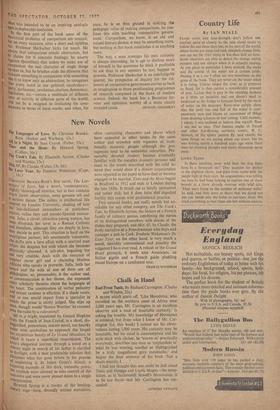New Novels
The Languages of Love. By Christine Brooke- Rose. (Seeker and Warburg, 15s.)
CHRISI INE BROOKE-ROSE'S first novel, The Lan- guages of Love, has a smart, 'contemporary,' slightly showing-off exterior, but in fact contains Much clever observation, some genuine wit and a serious theme. The milieu is intellectual life centred on London University, shading off into the less-dedicated atmosphere of publishers' Parties, coffee bars and pseudo-Spanish restaur- ;Ins. Julia, a clever, attractive young woman, has Deco divorced; her lover is a Roman Catholic and therefore, although they are deeply in love, theY decide to part. This situation is hard on the nnreligious partner; left emotionally vulnerable, sIC drifts into a love affair with a married man Mlom she despises but with whom she becomes PhYsically obsessed. A sub-plot, beguiling but not very credible, deals with the romance of another clever girl and a charming Moslem African who speaks in proverbs. Julia, both her lovers and the wife of one of them are all Philologists; so, presumably, is the author and, as communication is her theme, she expounds some scholarly theories about the languages of the heart. The combination of verbal pedantry and sexual candour is effective, if a shade vou/u, and as one would expect from a specialist in Words the prose is nicely judged. She slips up unce, though; would 'Stormy Weather' be crooned over the radio by a coloratura? e 411 in a Night, translated by Gerard Hopkins "oin the French of Jean Cayrol, is a short, dis- lioguished, pretentious, remote novel, too heavily kaden with symbolism to approach the limpid utit mysterious beauty of Le Grand Meaulnes, to hieh it bears a superficial resemblance. The nero's allegorical journey through a wood on a .te'rn.IY night in search of his father is clarified In daylight, with a neat predictable solution that dissipates what has gone before in the process hnf explaining it. In Julien Green's Mundt, a anoting example of this dark, romantic genre, `no symbols were allowed to take control of the narrative and were never pinned down to a single interpretation. Howard Spring is a master of the lending- ibrary saga—long, decently written narratives, often containing characters and places which have appeared in other books by the same author and crowded with vignettes of tradi- tionally eccentric people although the pro- tagonists tend to be somewhat colourless. Pre- sumably devoted readers become eventually familiar with the complex dramatis persona' and react to the events described with the mild in- terest they would show if a distant acquaintance were reported in the paper to have died or become engaged to be married. Time and the Hour begins in Bradford in 1912 and ends in London during the late 1930s. It struck me as' totally uninspired and rather dull; but it does have that dignified facility that comes with professional practice.
Two unusual books, not really novels but un- suitable for any other category, are The Cook's Tale, by Elisabeth Ayrton, the history of a French family of culinary genius, combining the stories of its distinguished members with details of the dishes they prepared, and Mrs. 0', by Claude, the lively narrative of a Frenchwoman who buys and manages a pub in Cork. Frederic Wakeman's De Luxe Tour, on the other hand, is very much a novel, slavishly conventional and possibly the vulgarest I have ever read. A rehash of the Grand Hotel gimmick, it sends nine Americans, an Italian gigoro and a French guide plodding round Europe on a conducted tour.
FRANCIS WYNDHAM


































 Previous page
Previous page